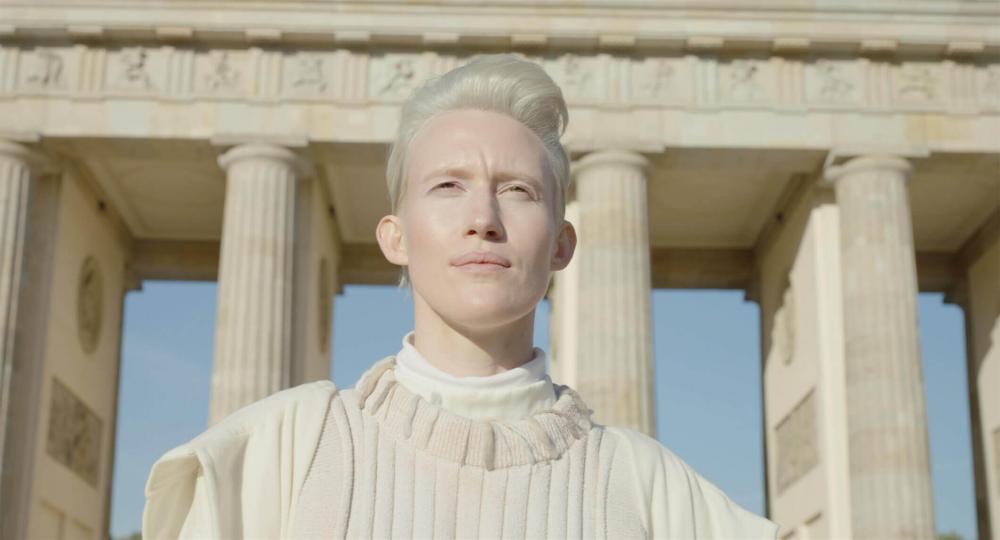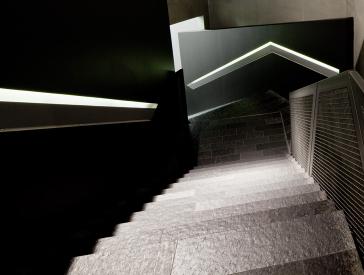
Yael Bartana
Redemption Now
Exhibition
The Jewish Museum Berlin presented Yael Bartana – Redemption Now. This large-scale solo exhibition of the contemporary artist Yael Bartana investigated the power of imagination and art’s redemptive potential. For more than twenty years, Bartana has been inquiring into grand historical narratives that help to constitute national and other collective identities.
The show brought together more than fifty early and more recent works, including video installations, photographs, and neon works.
Past exhibition
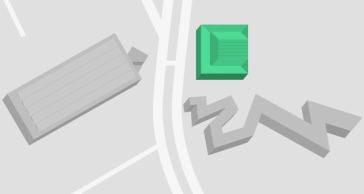
Where
Old Building, level 1
Lindenstraße 9–14, 10969 Berlin
The exhibition followed an eschatological topos – the recurring idea that a leader may bring salvation – and its deconstruction. At the core of the show was the commissioned video work Malka Germania (Hebrew for “Queen Germania”), which Bartana conceived for the Jewish Museum and produced at historically charged locations across Berlin.
An androgynous savior figure comes to the German capital. Her journey floods the city with scenes from an imagined collective unconscious; past and future merge in an alternative present. The installation’s theme of collective redemption addressed traumata, hopes of salvation, and the desire for change.
Yael Bartana’s works have been exhibited worldwide and form part of international collections. She is known for exploring the visual languages of identity and memory politics, nations, and social movements.
Yael Bartana observes, documents, dissects, and reinvents public rituals, ceremonies, and social practices that are intended to build collective identities. Her art provokes an activist viewing – asking visitors to engage in the political act of reflecting on their responsibility in society.
Yael Bartana was born in Israel in 1970 and currently lives in Amsterdam and Berlin.

Exhibition Yael Bartana – Redemption Now: Features & Programs
- Exhibition Webpage
- Current page: Yael Bartana – Redemption Now: 4 Jun to 21 Nov 2021
- Publications
- Yael Bartana. The Book of Malka Germania: English edition, 2021, with reading sample for download
- Yael Bartana. Das Buch der Malka Germania: German edition, 2021, with reading sample for download
- Digital Content
- Exhibition opening: Video, 2021
- Podcast series Malka, Who?: Four episodes, 2021, in English and German
- Who is Malka Germania? Yael Bartana in conversation with Shelley Harten and Gregor H. Lersch, 2021
- Artist Talk with Yael Bartana: Video recording, 2021
- See also
- Yael Bartana, Artist
Exhibition Topics
- Degenerate Art Is Alive
- The World Turned Upside Down
- The End of the World Cycle
- The Study Room
- Malka Germania
- The Pre-Enactment Method
- The JRMiP Archive
Degenerate Art Is Alive
Yael Bartana animates the figures from Otto Dix’s 1920 painting War Cripples into a crowded, squeaking and clomping procession. After the First World War, Dix made drawings of protesting veterans who were demanding state recognition of their service. During the Nazi era, Dix’s works were labeled as “degenerate” and banned. The painting War Cripples was destroyed and exists only in print. In Bartana’s animation, the old heroes come to life as surviving artworks. The work’s German title Entartete Kunst Lebt means “Degenerate Art Lives” and alludes to the slogan “The People of Israel Lives” ( עם ישראל חי, Am Israel Chai). The film calls upon viewers to join the procession, to transform strength into vulnerability, answers into questions, and convictions into art.
Yael Bartana, Entartete Kunst Lebt (“Degenerate Art Lives,” excerpt), 2010, animation, 16 mm film and sound, 5 min; courtesy of Annet Gelink Gallery, Amsterdam, and Sommer Contemporary Art, Tel Aviv
The World Turned Upside Down
Yael Bartana has been confounding her audience’s sense of what is real for over two decades. Indeed, the feeling of navigating a world that blurs the lines between reality and fiction fits the current climate to a tee. Particularly in her early, documentary works, Bartana observed social rituals that create order in people’s chaotic day-to-day lives. In the Jewish tradition, the era of redemption is preceded by a period of crisis and the initial “birth pangs of the Messiah.”
A Selection of Excerpts from the Video Works
When Adar Enters, 2003
Bartana captures impressions of Orthodox-Jewish neighborhoods in Bnei Brak and Jerusalem during the festival of Purim in the Jewish month of Adar. The sense of intruding on the insular ultra-Orthodox community carries over to the viewer’s gaze. The holiday of Purim commemorates the Jews’ rescue from annihilation in the empire of the Persian King Ahasuerus. Celebrants of Purim are obligated to be joyful and to replace their routines for a day of drinking and costumes. Some believers expect a similar reversal (Hebrew: hipuch) to occur with the arrival of the Messiah—when the whole truth is to be revealed and rules will be superfluous.
Yael Bartana, When Adar Enters (excerpt), 2003, one channel video and sound installation, 7 min; courtesy of Annet Gelink Gallery, Amsterdam, and Sommer Contemporary Art, Tel Aviv
Ad de’lo Yoda, 2003
Yael Bartana films an ultra-Orthodox Purim celebration. The festive parade is called “Ad de’lo Yoda,” an Aramaic saying that means “until you don’t know anything anymore” and describes reaching a state of absolute intoxication. Through a half-open door, the viewers glimpse what is happening over a boy’s shoulders. Like the artist operating the camera, the viewers remain outsiders, away from the celebration.
Yael Bartana, Ad de’lo Yoda (excerpt), 2003, one channel video installation, 3 min; courtesy of Annet Gelink Gallery, Amsterdam, and Sommer Contemporary Art, Tel Aviv
Wild Seeds, 2005
A group of military-conscription aged young people assemble to play a game simulating the evacuation of a Jewish settlement. The teenagers sit on the grass, tangling their limbs in an effort to stay together. Others take the roles of soldiers trying to tear the group apart. The play-acting cries of “traitors,” “a Jew doesn’t deport other Jews,” and “the Messiah is coming” give way to laughter and joyful squeals. The video is staged, but is based on actual confrontations and a game invented by Israeli activists. Wild Seeds oscillates between the satisfaction of belonging, political conflict, and religious zeal. It demonstrates ways in which a society in permanent expectation of crises learns to remain at the ready.
Yael Bartana, Wild Seeds (excerpt), 2005, two channel video and sound installation, 6:40 min; courtesy of Annet Gelink Gallery, Amsterdam, and Sommer Contemporary Art, Tel Aviv
Kings of the Hill, 2003
On Friday afternoons, drivers of 4x4s and SUVs try to traverse the dunes near Tel Aviv. This recreational activity is performed almost exclusively by men, making it a kind of macho father-son ritual. Wives and daughters are left at the margins. In a society perpetually on the alert, this pastime of mastering the rugged landscape also prepares the drivers for future deployments. In documentary style, Yael Bartana combines the romance of the landscape, masculine stereotypes, and an almost absurd impulse to exert control.
Yael Bartana, Kings of the Hill (excerpt), 2003, one channel video and sound installation, 7:30 min; courtesy of Annet Gelink Gallery, Amsterdam, and Sommer Contemporary Art, Tel Aviv
The End of the World Cycle
In uneasy times, the longing for redemption grows. Over and over in history, crises have been associated with apocalyptic moods and a feeling that salvation is imminent. In Jewish tradition alone, there have been several proclamations of the Messiah’s arrival, such as the cases of Bar Kochba (d. 135) and Shabbatai Zevi (1626–1676). The desire for leadership during difficult times can often be explained by a given time period’s political and historical contexts.
Yael Bartana has explored the cyclical pronouncements that the world is ending in various works. Her most recent work on the subject, the installation Malka Germania (2021), is presented as the centerpiece in a later room of this exhibition. These works portray the plurality of messianic hopes as historical moments in which fiction and reality overlap.
The Study Room
Notions of salvation can be dangerous, as they oversimplify things. The prospect of redemption promises a solution to all problems, an attitude diametrically opposed to the study of scripture and religious texts in Judaism with its process of incessant questioning.
The study room is a place for rising above ignorance and stereotypes. The neon sculpture What if Women Ruled the World prompts visitors to contemplate imagination and questions of personal responsibility in society. Surrounded by Yael Bartana’s self-portraits in various personas, you are invited to read the exhibition publication, which adopts the polyphonic method of the Talmud, the core text of rabbinical Judaism. With Abracadabra, created during the pandemic, Bartana points to the relationships between science and superstition, modernity and mysticism. Memorials and performance projects by the artist are presented on tablets.
Selection of Artworks
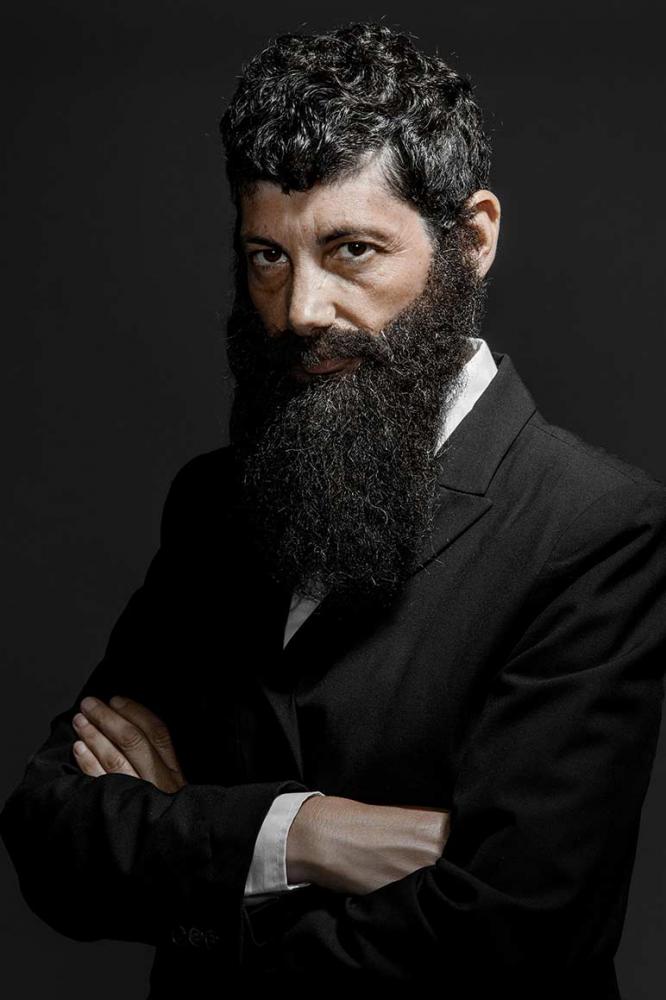
Herzl I, 2015
“If you wish it, it is no fairy-tale!”
This often-quoted phrase by Theodor Herzl (1860–1904) has been fascinating Yael Bartana for many years. In her Herzl series the artist adopts the role, posture, dress and even the beard of the Zionist visionary and leader. Bartana inquires into the relationship between power and masculinity.
Yael Bartana, Herzl I, 2015, photograph series of 6 images total, color photograph, fine art print, 60 × 40 cm
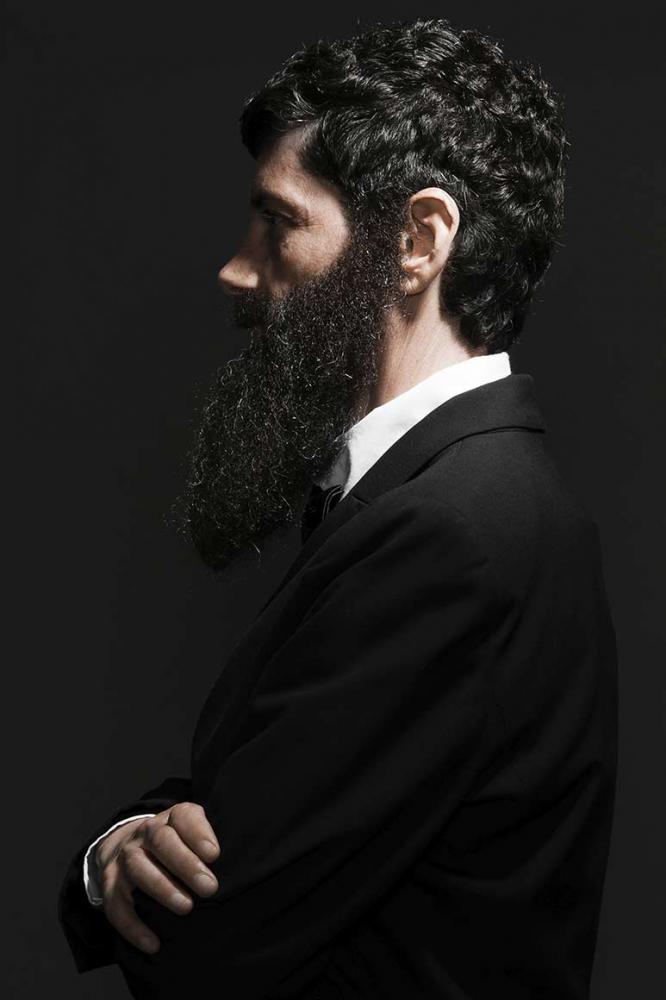
Herzl II, 2015
“If you wish it, it is no fairy-tale!”
This often-quoted phrase by Theodor Herzl (1860–1904) has been fascinating Yael Bartana for many years. In her Herzl series the artist adopts the role, posture, dress and even the beard of the Zionist visionary and leader. Bartana inquires into the relationship between power and masculinity.
Yael Bartana, Herzl II, 2015, photograph series of 6 images total, color photograph, fine art print, 60 × 40 cm
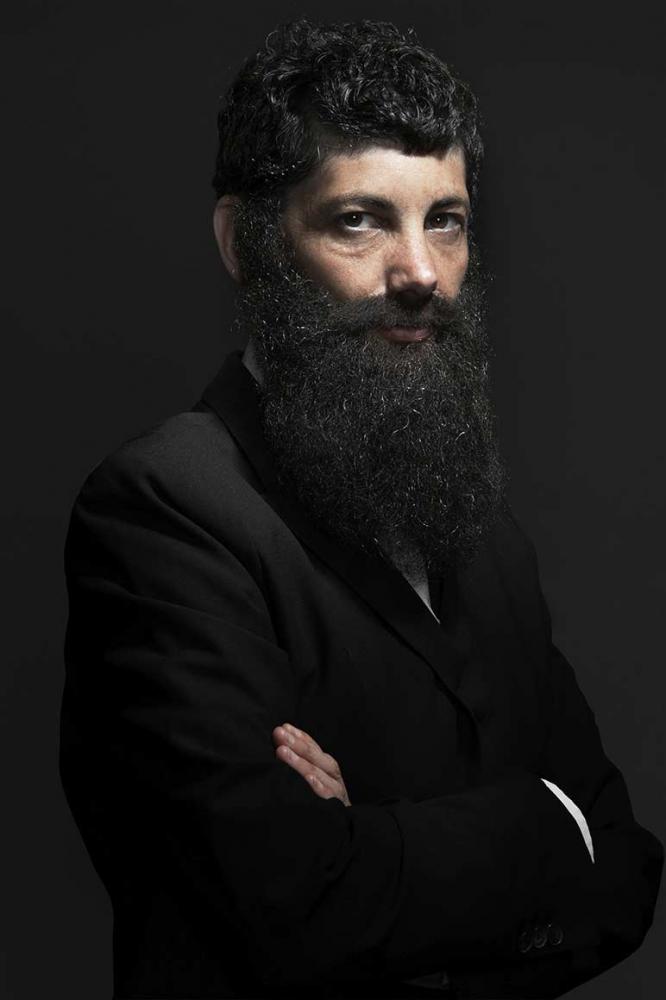
Herzl III, 2015
“If you wish it, it is no fairy-tale!”
This often-quoted phrase by Theodor Herzl (1860–1904) has been fascinating Yael Bartana for many years. In her Herzl series the artist adopts the role, posture, dress and even the beard of the Zionist visionary and leader. Bartana inquires into the relationship between power and masculinity.
Yael Bartana, Herzl III, 2015, photograph series of 6 images total, color photograph, fine art print, 60 × 40 cm
Malka Germania
The video work Malka Germania, commissioned by the Jewish Museum Berlin, investigates the longing for collective redemption as a response to an age of anxiety. An androgynous messianic figure, Malka Germania, arrives in Berlin and brings about a series of changes in the city: the past and future implode into an alternative present.
More on Malka Germania
Malka Germania is Hebrew for “Queen Germania.” The name makes reference to an unusual female designation for the Messiah: “Malka Meshichah,” or the “Annointed Queen.” The Messiah has come to Berlin and thus to the historic epicenter of Jewish, Israeli, and German collective memory. Instead of experiencing immediate redemption, as the exhibition’s title might imply, the city is haunted by its residents’ collective subconscious: their dreams, fears, and memories. The piece portrays subconscious elements, gray areas, and ambiguities of contemporary German-Jewish experience through the artistic medium. At the same time, it attempts to disrupt a fixed iconography and to deconstruct identities.
Bartana leaves the question of who is to be redeemed ambiguous. Perhaps it is people trying to shake off the Nazi past? Or others who want to move on from the trauma of the Holocaust? Or does she mean all humankind as the beneficiaries of a messianic age? The commissioned work shows how impossible it is to break away from personal or inherited pasts. At the same time, it preserves the tension of redemption, which is a core element of national myths and collective identities.
Beyond the video installation itself, Bartana adds another layer of public engagement with savior figures. A vitrine cabinet recessed in the video wall reveals a collection of statuettes of Malka Germania with an eagle. Resembling a museum storage facility, this display raises the prospect of Malka being historicized and commercialized as a cultural icon. The association between the savior figure and the national symbol combines religious expectations with political ones. The liberation of the eagle by the Messiah, as depicted on the exhibition poster, stands allegorically for the moment of redemption.
The video installation Malka Germania is a specially commissioned work and was made possible by the Friends of the Jewish Museum Berlin, the Mondriaan Fund and Jan Fischer (Light Art Space, LAS).
Film Stills
The Pre-Enactment Method
Remembering the past and grappling with history play a significant role in the present-day formation of collective identities. In many of her works, Yael Bartana proposes future events that may become historical realities. She stages pseudo-historical situations, travels into the viewers’ collective memories, reflects upon their utopias, recalibrates historical forms of representation, and charts new paths into the future.
The JRMiP Archive
The Jewish Renaissance Movement in Poland (JRMiP) is Bartana’s most famous complex of artworks. It consists of the video trilogy And Europe Will Be Stunned, which was Poland’s contribution to the 2011 Venice Biennale. In 2012, an international convention was held, the First Congress of the Jewish Renaissance Movement in Poland (JRMiP), as part of the Berlin Biennale. In addition, an abundance of objects, graphics and merchandise accompanied the project at various exhibition venues. The JRMiP seeks to encourage the return of Jews to Poland, applying an open-ended definition of Jewishness. This vividly demonstrates some of the ways Bartana probes the effects of reality and fiction, past and present, propaganda and art. The display of JRMiP memorabilia alongside the primary video art self-referentially stages the JRMiP as a museum exhibit, placing this imaginary political movement into a kind of reality.
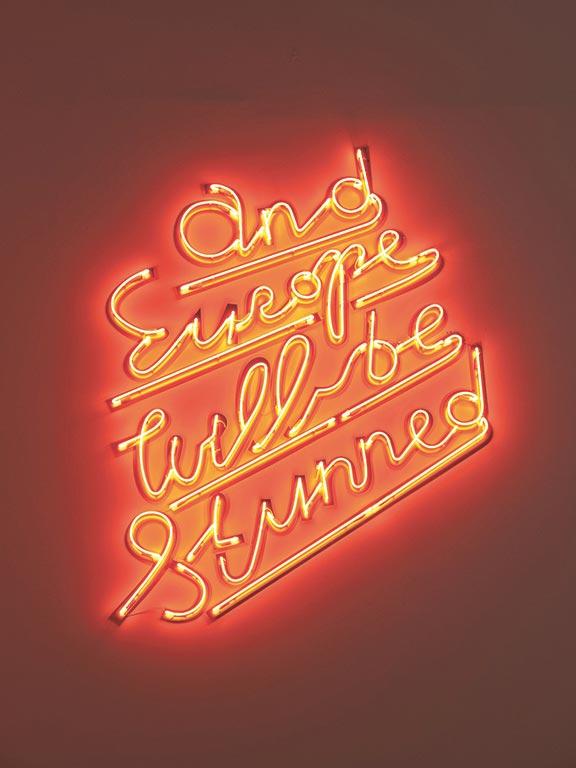 X
X
Yael Bartana, And Europe Will Be Stunned, 2010, neon, 125 × 110 cm; courtesy of THE EKARD COLLECTION
A Selection of Excerpts from the Video Works
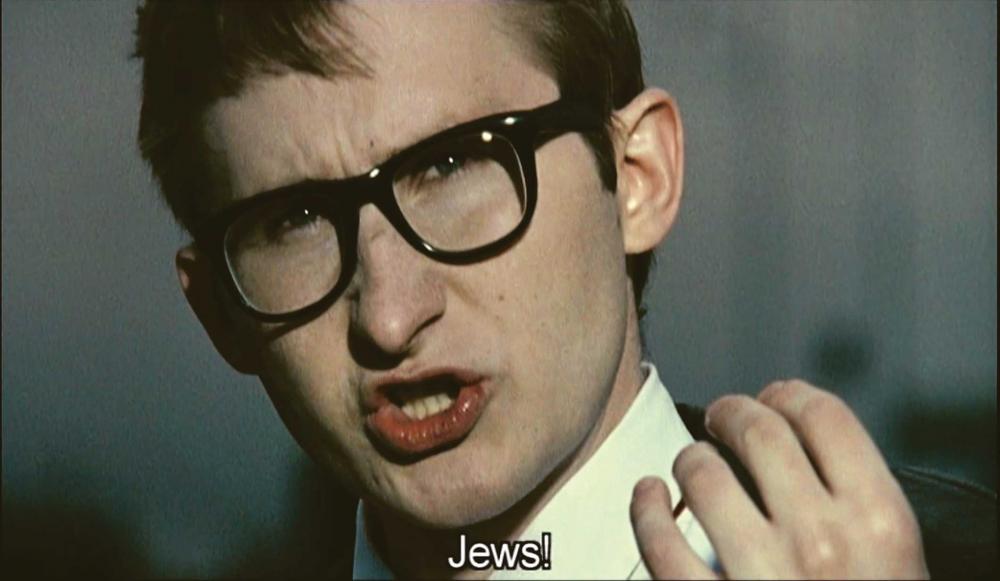
And Europe Will Be Stunned – Mary Koszmary (Nightmares), 2007
Mary Koszmary (Nightmares) is the first film in the And Europe Will Be Stunned trilogy, which presents the Jewish Renaissance Movement in Poland. The film explores the complicated relationships between Jews, Poles, and Europeans in an age of globalization. A young activist, portrayed by Sławomir Sierakowski, delivers a speech in the abandoned Warsaw National Stadium in which he calls upon three million Jews to return to Poland. In the style of a propaganda film, the piece speaks to antisemitism and racism in 2007 Poland, but also references the longing of Polish intellectuals for a Jewish past and the Zionist dream of a return to Israel.
Yael Bartana, And Europe Will Be Stunned – Mary Koszmary (Nightmares) (film still), 2007, one channel video and sound installation, 11 min; courtesy of Annet Gelink Gallery, Amsterdam and Foksal Gallery Foundation, Warsaw
And Europe Will Be Stunned – Mur i wieza (Wall and Tower), 2009
For the second film of the And Europe Will Be Stunned trilogy, Mur i Wieza (Wall and Tower), members of the Jewish Renaissance Movement in Poland built a full-scale kibbutz in a 1930 architectural style in Warsaw’s Muranów district. A kibbutz is a collective, rural and sometimes industrial, Zionist community. Most of them were built in the early twentieth century during the period of Jewish immigration to Palestine under the British Mandate, and then, from 1948 onward, in the State of Israel. The JRMiP Kibbutz was erected on a site in central Warsaw where a Jewish neighborhood, and later part of the Warsaw Ghetto, once stood. The film draws on historical images of Zionist pioneers who are fundamental to Israel’s collective memory. The pioneers were portrayed as bold heroes who, despite adverse conditions, built their own houses, cultivated the land, pursued their studies, raised their children collectively, shared their property, and constantly drilled tactics to fend off prospective enemy attacks. In a completely different political and geographical context, during the twenty-first century, Bartana re-enacts this world. In the process, she acerbically juxtaposes utopias and dystopias, poised between failure and fulfillment.
Yael Bartana, And Europe Will Be Stunned – Mur i wieza (Wall and Tower) (excerpt), 2009, one channel video and sound installation, 15 min; courtesy of Annet Gelink Gallery, Amsterdam, and Sommer Contemporary Art, Tel Aviv
And Europe Will Be Stunned – Zamach (Assassination), 2011
In the third and final film of the And Europe Will Be Stunned trilogy, Zamach (Assassination), Bartana puts the Jewish Renaissance Movement’s dream of a multinational community and a new Polish society to the test. The film takes place in the near future, at the funeral of the JRMiP leader who has been murdered by an unknown assassin. With this symbolic death, Bartana releases the myth of the new political movement—a movement that could perhaps take concrete shape in Poland, Europe, or the Middle East.
Yael Bartana, And Europe Will Be Stunned – Zamach (Assassination) (excerpt), 2011, one channel video and sound installation, 35 min; courtesy of Annet Gelink Gallery, Amsterdam, and Sommer Contemporary Art, Tel Aviv
Curators: Dr. Shelley Harten and Dr. Gregor H. Lersch.
The exhibition is accompanied by the publication Yael Bartana. The Book of Malka Germania (details on the publication and reading samples). The volume is also available in German.
Yael Bartana. The Book of Malka Germania (trailer)
Yael Bartana − Redemption Now: Works in the Exhibition
Entartete Kunst Lebt, 2010
Animation, 16 mm film and sound, 5 min
Courtesy of Annet Gelink Gallery, Amsterdam, and Sommer Contemporary Art, Tel Aviv
Animation: Hadar Landsberg
Sound Design: Daniel Meir
Production: Israel, the Netherlands
Commissioned by the Center for Contemporary Art Tel Aviv (CCA)
When Adar Enters, 2003
One channel video and sound installation, 7 min
Courtesy of Annet Gelink Gallery, Amsterdam, and Sommer Contemporary Art, Tel Aviv
Editor: Yael Bartana
Sound Design: Daniel Meir
Production: Israel, the Netherlands
Ad de’lo Yoda, 2003
One channel video installation, 3 min
Courtesy of Annet Gelink Gallery, Amsterdam, and Sommer Contemporary Art, Tel Aviv
Camera and Editor: Yael Bartana
Production: Israel, the Netherlands
Wild Seeds, 2005
Two channel video and sound installation, 6:40 min
Courtesy of Annet Gelink Gallery, Amsterdam, and Sommer Contemporary Art, Tel Aviv
Producer: Ilil Bartana
Camera: Yael Bartana, Itai Neeman
Editor: Yael Bartana, Thalia Hoffman
Sound Design: Daniel Meir
Production: Israel, the Netherlands
Kings of the Hill, 2003
One channel video and sound installation, 7:30 min
Courtesy of Annet Gelink Gallery, Amsterdam, and Sommer Contemporary Art, Tel Aviv
Camera and Editor: Yael Bartana
Production: Israel, the Netherlands
Waiting for the Messiah, 2014/2020
Pigment print (originally 80 x 120 cm)
Research Assistant: Fabio Zuker
Illustrator: Batia Kolton
Graphic Design: Gila Kaplan, Oded Korach
Supported by the 31st São Paulo Biennale, 2014
Next Year in New Jerusalem, 2014
Neon, 105 cm in diameter
Courtesy of Galeria Raffaella Cortese, Milan, and Sommer Contemporary Art, Tel Aviv
Design: Guy Saggee
Simone the Hermetic, 2015
One channel sound installation, 15 min
Director: Yael Bartana
Text: Noam Rotem
Text Editor: Noa Shuval
Sound Design: Daniel Meir
Production: Israel, Niederlande
Commissioned by Jerusalem Season of Culture 2015
Abracadabra, 2020
Digital print, 84.1 x 59.4 cm
Graphic Design: Avi Bohbot
What if Women Ruled the World, 2016
Neon, 250 x 97.5 cm
Courtesy of Collezione Carmela Sanguedolce
Herzl, 2015
Photograph series of 6 images, color photograph, fine art print, 60 x 40 cm: Herzl (I–III); Jonathan; Daniel; Isaac
Photographer: Daniel Sheriff
Costume Designer: Yael Shenberger
Make-Up: Omer Asaf
Resurrection II, 2020
Color photograph, fine art print, 25 x 17 cm (without frame)
Photographer: Marc Junghans
Public Art and Performances (referenced in the exhibition)
Memorial to the Homosexuals Persecuted Under Nazism, 2018
Director and Editor: Yael Bartana
Director of Photography: Mick van Rossum
Producer: Naama Pyritz
Post production supervisor: Eran Feller
Color Correction: Ido Karela
Research: Itamar Gov
Still photographer: Birgit Kaulfuss
Costume: Nadja Eller
Make-Up: Inbal Sitin
Participants: Agnesh Pakozdi, Mo Sun, Rebecca Ofek, Uri Gov
All images used in the work courtesy of Schwules Museum Berlin
The Orphan Carousel, 2021
Memorial to the Rescuing Kindertransports of 1938–39, Frankfurt
Concept & Idea: Yael Bartana
Architecture: Florian Stirnemann
Construction: Noibau, Ertl und Zull
Project Coordination: Anja Lindner
Commissioned by the City of Frankfurt am Main (Head of Project: Kulturamt Frankfurt am Main, Dr. Jessica Beebone)
Monumento a la Ausencia, Denkmal der Abwesenden, Mexico City, 2018
Concept: Yael Bartana
The monument was created as part of the collective compensation ruled by the Victim Attention Executive Commission (CEAV), formed by the federal government, in collaboration with the Tlatelolco University Cultural Center, UNAM.
Two Minutes of Standstill, Cologne, 2013
A collective performance by Yael Bartana
Spatial Concept: Jackie Shemesh
Graphic Design: Gila Kaplan, Oded Korach
A project by Impulse Theater Biennale 2013, founded by the Academy of the World, Cologne. In collaboration with Theaterakademie Köln.
What if Women Ruled the World, 2017/2018
Participants: Alix Wilton Regan (actor), Amy J. Nelson, Anat Saragusti (moderator), Anja Dalgaard-Nielsen, Anja Van der Hulst, Antke Engel, Anni Helena Routsala, Antje Stahl (moderator), Bana Gora, Beyza Unal, Birgitta Jónsdóttir, Camilla Tenna Nørup Sørensen, Carina Ann Meyn, Carmen Wunderlich, Christina von Braun, Christine Muttonen, Diani Barretto, Frances Raday, Galit Eilat, Heather Linebaugh, Holly Kilroy, Illa Ben Porat, Irena Sabic, Jelia Sane, Jo Martin (actor), Karin von Hippel, Kasha Nabagasera, Kate Raworth, Kübra Gümüşay, Leyla Hussein, Lina Khatib, Lisa Ling, Lone Træholt, Marion Koopmans, Mariam Ibrahim Yusuf, May Zeidani, Naila Bozo, Nancy Hollander, Natasha Walter, Noura Bittar Søborg, Olwen Foeuéré (actor), Or (Ori) Rabinowitz, Patricia Flor, Patricia Lewis, Paula Peters, Reem Fadda, Samira Saraya (actor), Sarai Aharoni, Seida Saric, Sharon Squassoni, Shogofa Sahar, Sophia Besch, Susan George, Tarja Cronberg, Ulrike von Pilar, Virginia Wangare Greiner, Xanthe Hall
Concept, Script and Director: Yael Bartana
Set Design: Saygel & Schreiber
Lighting Design: Jackie Shemesh
Sound Design: Daniel Meir
Graphic Design: Avi Bohbot, Gila Kaplan
Producers: Yael Bartana, Jo Paton Htay (MIF), Naama Pyritz (Ingenue Productions)
Stills Photographer: Birgit Kaulfuss
Studio Yael Bartana: Itamar Gov, Esper Postma, Saskia Wendland
What if Women Ruled the World? is commissioned and produced by Manchester International Festival, European Capital of Culture Aarhus 2017 and Volksbühne Berlin.
Supported by Mondriaan Fund
Die Schofar Schule, 2020
Project by: Yael Bartana
Participants: Annie Albagli, Harry Dukker, Thomas Lunderquist, Yarden Stern, Jeannine Dath, Gabriel Nahoum, Nikolay Karabinovych, Arthur Hirsch, David Bernstein, Solange Akierman, Katja Petrowskaja, Elisabeth Belisário
Shofar teacher: Miriam Camerini
Respondents: Wanda Nanibush, Banjamin Seroussi
A project initiated and coproduced by Kunstenfestivaldesarts in the frame of The Diasporic Schools In collaboration with: Casa do Povo
Redemption Now, 2021
Neon, 180 x 128 cm
Courtesy of a private collection, Southern Germany
Malka Germania, 2021
Three channel video and sound installation, 43 min
Director and Editor: Yael Bartana
Producers: Naama Pyritz, Martina Haubrich
Actress: Gala Moody
Director of Photography: David Stragmeister
2nd Unit Camera: Mick van Rossum, Matan Radin
Costume Designer: Yael Shenberger
Art Director: Karin Betzler
Choreography: Hagar Ophir
Editor: Daphna Keenan
Sound Design: Daniel Meir
Research and story consultant: Itamar Gov
Story Consultant: Sami Berdugo, Mille Haynes
Additional Production: Anja Lindner
Additional Camera: Marcus Pohlus, Itai Vinograd, Walter Solon
Drone operators: Michael und Florian Basche
Voice: Susanne Sachsse
Storyboard & Illustration: Hadar Landsberg
Make-Up: Monique Bredow
Color Correction: Simon Veronig
Special Effects: snowball studios
Commissioned by the Jewish Museum Berlin and made possible by the Friends of the Jewish Museum Berlin, the Mondriaan Fund and Jan Fischer (Light Art Space, LAS)
Das Malka Depot, 2021
Installation
Styrofoam, polyuretan-foam (PU), plaster
Sculptors: Gunnar Zimmer, Frants Rodvalt
Low Relief II, 2004
Four channel video and sound installation, 5:40 min
Courtesy of Annet Gelink Gallery, Amsterdam, and Sommer Contemporary Art, Tel Aviv
Sound Design: Daniel Meir
Production: Israel, the Netherlands
The Missing Negatives of the Sonnenfeld Collection (after Herbert & Leni Sonnenfeld), 2008
Black and white photograph series of 22 images, paper: 48 x 32 cm, frame: 72.5 x 56.5 cm; paper: 32 x 48 cm, frame: 56.5 x 72.5 cm; size varies: 32 x 48 cm, 48 x 32 cm, 39 x 58.4 cm
Photographers: Amit Israeli & Yael Bartana
Commissioned by the Beit Hatfutsot – The Museum of The Jewish People, Tel Aviv
The Undertaker, 2019
One channel video and sound installation, 13 min
Courtesy of Annet Gelink Gallery, Amsterdam; Sommer Contemporary Art, Tel Aviv, and Petzel Gallery, New York
Bury Our Weapons, Not Our Bodies, 2018
Series of 7 masks, silkscreen on aluminum, 63.3 x 51.2 cm; 63.3 x 377 cm; 63.1 x 53.4 cm; 63.2 x 50.9 cm
Courtesy of the artist, Capitain Petzel Gallery, Berlin and Annet Gelink Gallery, Amsterdam
Trembling Time, 2001
One channel video and sound installation, 6:20 min
Courtesy of Annet Gelink Gallery, Amsterdam, and Sommer Contemporary Art, Tel Aviv
Camera and Editor: Yael Bartana
Sound Design: Tao G. Vrhovec Sambolec
Production: Israel, the Netherlands
And Europe Will Be Stunned, 2010
Neon, 125 x 110 cm
Courtesy of THE EKARD COLLECTION
And Europe Will Be Stunned: Mary Koszmary (Nightmares), 2007
One channel video and sound installation, 11 min
Courtesy of Annet Gelink Gallery, Amsterdam and Foksal Gallery Foundation, Warsaw
Actor: Sławomir Sierakowski
Text: Sławomir Sierakowski & Kinga Dunin
Producer: Naama Pyritz
Director of Photography: Itai Neeman
Editors: Yael Bartana, Daniel Meir, Anat Salomon
Sound Design: Daniel Meir
Color Correction: Yoav Raz
Thanks to the school children of Szkoła Podstawowa nr 73, ul. Białostocka 10/18, Warsaw
Supported by Annet Gelink Gallery, Amsterdam; The Fund for Video Art and Experimental Cinema, The Center for Contemporary Art, Tel Aviv Produced by Hermès, Paris, and Foksal Gallery Foundation, Warsaw
And Europe Will Be Stunned: Mur i Wieza (Wall and Tower), 2009
One channel video and sound installation, 15 min
Courtesy of Annet Gelink Gallery, Amsterdam, and Sommer Contemporary Art, Tel Aviv
Director and Editor: Yael Bartana
Producer: Naama Pyritz
Director of Photography: Uri Ackerman
Camera: Nicolas Villegas
Sound Design: Daniel Meir
Architect: Gilia Breger
Assistant Editor: Daniel Meir
Color Correction: Ido Karilla
After Effects: Eran Feller
Storyboard Illustration: Hadar Landsberg
Produced with the support of the Ostrovsky Family Fund, New York; the Netherlands Foundation for Visual Arts, Design and Architecture (Fonds BKVB), Amsterdam; the Museum of Modern Art, Warsaw; the Institute Adam Mickiewicz, Warsaw; the Goethe Institute, Warsaw; POLIN – the Museum of the History of Polish Jews, Warsaw; Annet Gelink Gallery, Amsterdam; Sommer Contemporary Art, Tel Aviv
And Europe Will Be Stunned: Zamach (Assassination), 2011
One channel video and sound installation, 35 min
Courtesy of Annet Gelink Gallery, Amsterdam, and Sommer Contemporary Art, Tel Aviv
Director and Editor: Yael Bartana
Producer: Naama Pyritz
Associate Producer: James Lingwood
Director of Photography: Itai Neeman
Camera: Uri Ackerman
Co-Editors: Thalia Hoffman, Daniel Meir
Art Director: Jacek Turewicz
Costume Designer: Malgorzata Trzaskowska
Actors: Sławomir Sierakowski, Susanne Sachsee, Alona Frankel, Yaron London, Anda Rottenberg, Dana Yahalomi, Salome Gersch, Marek Maj, Ewa Einhorn
Writers: Gish Amit, Sebastian Cichocki, Michael Kessus Gedalyovich, Alona Frankel, Yaron London, Anda Rottenberg
Text Editors: Illa Ben-Porat, Charles Esche, Marc Siegel
Script Consultants: Gish Amit, Illa Ben-Porat, Sebastian Cichocki, Galit Eliat, Camilla Nielsson
Colorist: Ido Karilla
After Effects: Eran Feller
Production Manager: Magdalena Nebelska
Original Music: Maya Dunietz & Daniel Meir
Lyrics: Noam Rotem
Supported by Annet Gelink Gallery, Amsterdam; Sommer Contemporary Art, Tel Aviv; Ikon, Birmingham; Australia Centre for Contemporary Art, Southbank; Artis, New York; Polish Institute, Tel Aviv
Produced by My-I Productions in association with Artangel, 2011
JRMiP Congress, 2012
Producer: Anja Lindner
Production Design and Lighting Design: Jackie Shemesh
Camera: Krunoslav Vrabat, David Rych, Julia Lazarus
Editor: Krunoslav Vrabat
Sound Designer: Daniel Meir
Production: the Netherlands, Germany
Photographer: Ilya Rabinovich
Commissioned by the 7th Berlin Biennal, 2012
We Shall Be Strong In Our Weakness, 2012
Neon, 50 x 190 cm
Courtesy of De Jong Groep, Amsterdam
Design: Guy Saggee
The video installation Malka Germania is a specially commissioned work and was made possible by the Friends of the Jewish Museum Berlin, the Mondriaan Fund and Jan Fischer (Light Art Space, LAS).
Exhibition Information at a Glance
- When 4 Jun to 21 Nov 2021
- Where Old Building, level 1
Lindenstraße 9–14, 10969 Berlin
See Location on Map
With the Support of

Media Partners




 X
X



































